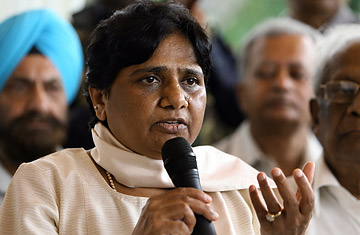
Bahujan Samaj party (BSP) Chief and Uttar Pradesh Chief Minister Mayawati addresses the media after a meeting with third front and left party leaders in New Delhi on July 20, 2008.
India on Friday took another step closer to completing a civilian nuclear-energy agreement with the United States, as the International Atomic Energy Agency approved the controversial deal. The nuclear deal, if finalized this fall, will be the most significant foreign policy achievement of Prime Minister Manmohan Singh's four years in office. But he won't be the only one crowing. The real winner in the deal, according to Indian political observers, is the earthy, shrewd, audacious Indian politician known simply as Mayawati.
Having used widespread Indian opposition to the nuclear deal as the organizing principle to gather a hodgepodge of nine political parties around her, Mayawati is positioning herself to become India's first Prime Minister who is a Dalit, a member of the low-caste grouping sometimes referred to as "untouchables." "This woman is a national Dalit icon," says Jai Mrug, a pollster and political analyst based in Mumbai (formerly Bombay). And she will use that image in India's election next year to galvanize opposition to what she says is a government that has focused on foreign policy at the expense of addressing the concerns of India's poor and unemployed.
It's a message that strikes the ruling Congress Party in a vulnerable spot. Mayawati's class-based message appeals not just to the roughly 16% of the population who are counted as Dalit but also to the one-third of Indians who live on less than $1 a day. Congress may find it more difficult to appeal to India's underclass with its broad platform of change through economic development.
Singh staked his political future on pursuing the nuclear deal, and his party has to convince voters that the deal is really about energy security and bringing electricity to the 44% of Indian households who have none. Rising Congress star Rahul Gandhi tried to make that rather esoteric case in his recent speech before Parliament, but the inheritor of the Gandhi-Nehru dynasty struggled to make himself heard above the noisy disruptions by irate legislators from Mayawati's Bahujan Samaj Party (BSP).
It was a classic example of Mayawati's brand of political theater. As Gandhi spoke, Mayawati's supporters waved documents purporting to prove that a massive corruption case against her was politically motivated, and accused Congress of using its power to persecute a "daughter of Dalits" who has survived on her wits and guts — a direct appeal to her base. Even her opponents admit to her skill at mobilizing voters. "The BSP's on the rise," says Devwrat Singh, a Congress MP from central India. The Uttar Pradesh regional elections last May were a runaway victory for Mayawati, who became chief minister of India's largest state and had the satisfaction of watching Congress finish fourth in a state it once dominated. While he doubts that Mayawati's message will succeed nationally, Devwrat says Congress learned a lesson in Uttar Pradesh: "We didn't have the organization."
Mayawati will need that organization to mobilize Dalit votes in states outside northern India where her party isn't traditionally strong. She'll get help from her new friends, an odd lot of parties ranging from urban Marxists to the backers of Hyderabad's high-tech economy. If she can turn the parliamentary alliance she built against the nuclear deal into a grass-roots political machinery, Manmohan Singh and his Congress Party may struggle to remain in power.
